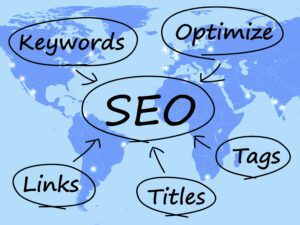 What should you look for when evaluating vendors for search engine optimization service? Are they accountable, thorough, and well planned; or are they just throwing ideas against the wall to see what will stick?Below is a basic outline of what you might consider when looking for a search engine optimization campaign management agency.
What should you look for when evaluating vendors for search engine optimization service? Are they accountable, thorough, and well planned; or are they just throwing ideas against the wall to see what will stick?Below is a basic outline of what you might consider when looking for a search engine optimization campaign management agency.
Keyword Research
What is keyword research? Keyword research is determining what your current site is about via evaluation of existing keywords / keyword phrases appearing on the site. It also requires evaluation of what your online and out of site competitors use as keywords / keywords phrases.
Online and out of site competitors? Let me explain. Online competitors are competitors in your desired keyword space on page one of the Google Search Engine Results Pages (SERPs). These may not be actual competitors within your industry, but they have a snippet in the top levels of the SERPs for a keyword that you have identified as important to your online presence.
Batteries are a prime example of online competitors that are not actual competitors in your industry. For example, if you are a battery manufacturer of high performance AGM (Advanced Glass Material) batteries for high performance and racing applications, you may also find online competition for high performance LiPo (Lithium Polymer) batteries for radio controlled (RC) vehicles and toys; high performance batteries for laptops; and a host of other battery operated devices and applications when performing a search query for the term ‘High performance batteries”.These are actually your online competitors.
Your out of site competitors are those that are recognized as a competitor in your industry, but have little to no exposure on the internet.That may seem hard to believe in today’s wired world, but, believe it or not, there are still many companies that just are not getting it done online.Your out of site competitors may be using industry keyword terms, but doing it poorly.
In any case, keyword research is step one in determining what keywords / keyword phrases are important in your industry and to your online marketing success.This is one reason that you may need to engage in a search engine optimization campaign.

Competition Analysis
Keywords
Page Titles With Keywords
Pages With Keywords On Page
Proprietary / Industry Standard Math
Provides Outline For What Keywords May Be Ranked And Content Created For
Provides Outline For What Keywords Should Be Assigned To Existing Content
Competitors – Who Are They And Where Do They Rank Currently In The SERPs
Analytics Implementation
Google Analytics: Implementation / Access
Google Search Console: Implementation / Access
Content Creation
Establish Content Creation Schedules And Timelines
Determine Keywords / Keyword Phrases
Reporting
Establish Levels Of Reporting To Satisfy Client Needs
Establish Reporting Schedules: Weekly / Bi-Monthly / Monthly
Provides For Tracking Of Success Or Failure
Ranking Result Tracking
Establish Which Keywords Should Be Tracked
Provides For Progress Reporting
Client Meetings
Establish Meeting Schedules With Client: Weekly / Bi-Monthly / Monthly
Establish Meeting Protocols: Conference Calls / On-line Screen Share Meetings
Weekly / Bi-Weekly / Monthly meetings establishes accountability
Client Communication
Establish Preferred Methodology Of Communication: Email / Project Management System / Voice / Combination
Search Engine Optimization Strategic Planning
Successful Search Engine Optimization Strategic Planning consists of all of the items mentioned above as well as a well laid out plan of implementation.
In many cases, you will find in the initial site audit analysis that there are basic search engine optimization specifications that have issues that could impact your ranking results, such as:
Incorrectly set canonical tags
Too long / Too short / Missing / Duplicate metadescriptions
Too long / Too short / Missing / Duplicate metadata page titles
Missing / Too many <h1> tags
Thin content
Broken Links Internal / External
Duplicate content
Broken images
Missing alt attributes
Misplaced nofollow attributes
Problematic response codes: 404s; 302s; 5xx; etc…
Missing language / encoding / doctype declarations
Pages with too many on page links
Pages with matching <h1> and title text content
Missing canonical references
While this is not an entire list of site issues that may be uncovered, it does help in developing your strategic plan.
For example:
If your initial site audits reveal that there are pages with matching <h1> and title text content, you may build into your strategic plan that this is one of your primary initial objectives; to remove these instances of matching <h1> and title content.
To tackle this objective, you will need to first determine the applicable keywords / keyword phrases for these pages since they are existing pages. Once that you have determined your applicable keywords / keywords phrases for the page, you can begin rewriting either your page title content, <h1> tag or both, if neither is applicable to your keywords / keyword phrases for the page.
Most recently, an existing Pay-Per-Click (PPC) client engaged our search engine optimization services. The client was an online vendor with thousands of pages of products. One item that was identified during the initial site audit review was that of duplicate content.
The client had the same 450+/- words of identical boilerplate content on each and every individual product page. This was a default setting in the shopping cart administration system.
We advised the client of what the issue was with duplicate content, and then had the duplicate content removed. This had an immediate and positive impact to the client’s keyword ranking results in the SERPs, and allowed us to delve into other areas of search engine optimization implementation without any negative setback or waiting for positive return.In the end, your strategic outline will be your guideline for establishing tasks, resources, and client expectations.
Hazards
Hazards are generally described as issues that need to be resolved, or at least identified, at the onset of a new search engine optimization campaign. Some examples are:
Slow Loading Pages
Blocking search engine spider crawls in the robots.txt file
Hacks / Malicious code
Problematic inbound links
Most recently, a new client came to us for a search engine optimization campaign. The initial attempt to run a site audit against the client’s NEW site failed. The only indicator we had from the site audit tool was that our spider was being blocked from being able to be crawl.
The first thing that we did was check the robots.txt and sure enough, all spiders, including Googlebot, were being blocked from crawling the site in the robots.txt.That block has been lifted, and we are now off to a successful start for this client’s search engine optimization campaign.
In case that you were wondering what it looks like to block search engines in you robots.txt, well, here you go:
User-agent: *
Disallow: /
What your robots.txt file should look like to allow search engines to crawl your site is:
User-agent: *
Disallow:
Off Page Factors
Banklink Profile Monitoring / Disavowal
Broken Links (Inbound creating 404 response codes)
While there are many issues that can have an impact on your ranking results in the SERPs for search query terms, you will need to have a well thought out strategy to implement.
You should re-evaluate those strategies on a monthly basis during the term of your search engine optimization campaign as specifications change, algorithms change, and Popular / important keywords change.
If you are considering entering in to a search engine optimization campaign for the first time or are looking for more success from your search engine optimization campaign; refer to the comments above when evaluating possible vendors or give one of our knowledgeable sales representatives a call.






























